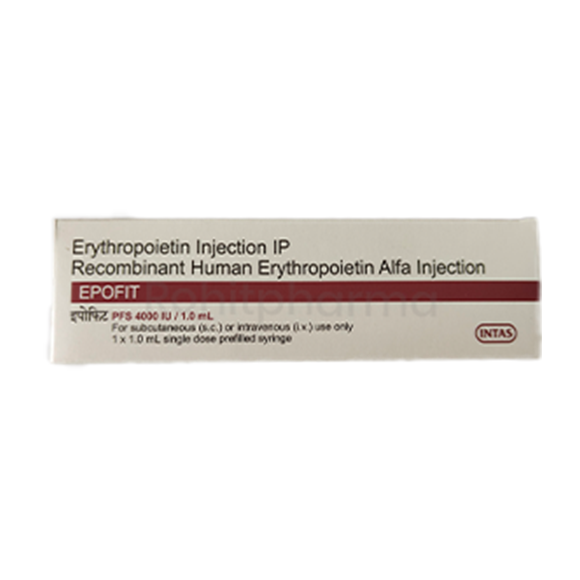Product Introduction
Epofit 4000 is a recombinant human erythropoietin that effectively manages anemia by encouraging the production of red blood cells in the bone marrow. It is particularly beneficial for patients undergoing dialysis or those receiving cancer treatments that suppress bone marrow function.
This medication is a cornerstone therapy for improving hemoglobin levels and alleviating symptoms of anemia, such as fatigue and weakness, thus enhancing patients' quality of life.
Uses of Epofit 4000
Epofit 4000 is primarily used for:

- Anemia in Chronic Kidney Disease – Stimulates red blood cell production.
- Chemotherapy-Induced Anemia – Helps counteract treatment-related anemia.
- Surgical Preparation – Increases red blood cell count prior to surgery.
Epofit 4000 ensures effective management of anemia, improving patient outcomes significantly.
Side Effects of Epofit 4000
Common side effects of Epofit 4000 may include:
- Headache
- Nausea
- Muscle pain
- Injection site reactions
- Flu-like symptoms
Less Common Side Effects
Less frequent but more serious side effects may include:
- Hypertension
- Thrombosis
- Allergic reactions
- Seizures
We are pleased to offer you this product.
Epofit 4000 ensures effective anemia management when used responsibly under medical supervision. It provides a trusted solution for patients with chronic conditions or undergoing intensive treatments.
- Administered as an injection under the skin or into a vein by a healthcare provider.
- Dosage and frequency depend on the underlying condition and response to therapy.
- Regular monitoring of hemoglobin levels is required to adjust dosage.
Epofit 4000 mimics natural erythropoietin, stimulating bone marrow to produce more red blood cells. This reduces symptoms of anemia and improves oxygen delivery to tissues.
- Improves hemoglobin levels effectively.
- Enhances energy and reduces fatigue.
- Supports recovery during dialysis or chemotherapy.
- Proven safety and efficacy profile.
- Use under strict medical supervision.
- Monitor blood pressure regularly.
- Avoid overdosing to minimize risks of thrombosis.
- Inform your doctor about any existing medical conditions or ongoing treatments.

